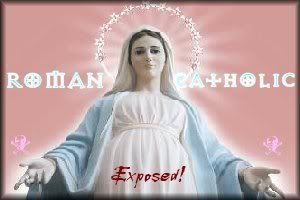| |
Transubstantiation
During the mass, priests allegedly have the power to supernaturally
turn the bread and wine into the actual and literal body and blood of
Jesus Christ:
| "The Council of Trent summarizes the Catholic faith by
declaring: "Because Christ our Redeemer said that it was
truly his body that he was offering under the species of
bread, it has always been the conviction of the Church of
God, and this holy Council now declares again, that by the
consecration of the bread and wine there takes place a
change of the whole substance of the bread into the
substance of the body of Christ our Lord and of the whole
substance of the wine into the substance of his blood. This
change the holy Catholic Church has fittingly and properly
called transubstantiation." Pg. 347, #1376. |
This Catechism quote reveals that the Catholic church still adheres
to this doctrine which was defined at the Council of Trent:
| "At the heart of the Eucharistic celebration are the
bread and wine that, by the words of Christ and the
invocation of the Holy Spirit, become Christ's Body and
Blood." Pg. 336 # 1333 |
The Catechism even specifies when Christ comes into the eucharist and
how long He stays:
| "The Eucharistic presence of Christ begins at the moment
of the consecration and endures as long as the Eucharistic
species subsist. Christ is present whole and entire in each
of the species and whole and entire in each of their parts,
in such a way that the breaking of the bread does not divide
Christ." Pg. 347 #1377 |
Since Catholicism is teaching members to partake in literal
cannibalism, this doctrine requires serious examination. To begin with,
we must determine this doctrine's origin. Is it from God, or is it a
tradition of men? Catholicism insists it is scriptural, citing the words
of Jesus in John 6:
| "Except ye eat the flesh of the Son of man, and drink
his blood, ye have no life in you. Whoso eats my flesh, and
drinks my blood, hath eternal life; and I will raise him up
at the last day." John 6:53-54 |
Though this one verse does appear to teach cannibalism, if you read
the entire passage in context, the meaning becomes clear. Right before
making that statement, Jesus said:
| "... For the bread of God is he which cometh down from
heaven, and gives life unto the world. Then said they unto
him, Lord, evermore give us this bread. And Jesus said unto
them, I am the bread of life: he that cometh to me shall
never hunger; and he that believeth on me
shall never thirst." John 6:33-35 |
This teaching is consistent with the rest of Scripture. Eternal life
comes through believing in Jesus Christ, not eating His body. The Lord
goes on to further clarify:
| "And this is the will of him that sent me, that every
one which sees the Son, and believeth on him,
may have everlasting life..." John 6:40 |
Again, Jesus points out that eternal life comes through believing in
Him. When the Lord's disciples murmured at His words, Jesus explained:
| "It is the spirit that quickens; the flesh profits
nothing: the words that I speak unto you, they
are spirit, and they are life." John 6:63
|
Jesus was talking spiritually, not physically. He was explaining that
spiritually, all life comes through faith in Him, not eating His body.
Nowhere else in the Bible does God endorse cannibalism. In fact, God
forbids the practice:
| "But flesh with the life thereof, which is the blood
thereof, shall ye not eat."
Genesis 9:4
"... No soul of you shall eat blood,
neither shall any stranger that sojournes among you eat
blood." Leviticus 17:12 |
God would never command His children to do something He had already
forbidden.
The Biblical Purpose
Paul's instructions in 1 Corinthians 11 shed even more light on this
matter:
| "For I have received of the Lord that which also I
delivered unto you, That the Lord Jesus the same night in
which he was betrayed took bread: And when he had given
thanks, he brake it, and said, Take, eat: this is my body,
which is broken for you: this do in remembrance
of me." 1 Corinthians 11:23-24 |
When Jesus said, "Take, eat: this is my body," He was not suggesting
that they reach out and begin eating His literal body. To even suggest
such is ridiculous. He was speaking spiritually about what He was about
to accomplish on the cross.
Notice how that verse ends: "...this do in remembrance of me."
Observing the Lord's Supper is a remembrance
of Christ's work at Calvary, not a reenactment. The same is true of
Christ's blood:
| "After the same manner also he took the cup, when he had
supped, saying, This cup is the new testament in my blood:
this do ye, as oft as ye drink it, in
remembrance of me." 1 Corinthians 11:25 |
Jesus Himself taught the same lesson to his disciples at the Last
Supper:
| "And he (Jesus) took bread, and gave thanks, and brake
it, and gave unto them, saying, This is my body which is
given for you: this do in remembrance of me."
Luke 22:19 |
Conclusion
Since transubstantiation is another unscriptural Catholic tradition
of men, several more intriguing questions await an answer:
- Why does the Catholic church deliberately take one verse of
Scripture out of context and build a doctrine the Bible obviously
does not teach?
- Why would the Catholic church rather have you eating God than
placing your faith in Him?
- Most importantly, can you knowingly partake in this practice now
that you know the truth?
| "Therefore to him that knows to do good, and does it
not, to him it is sin." James 4:17 |


|



